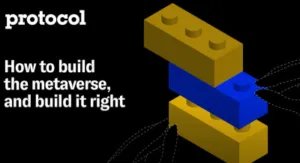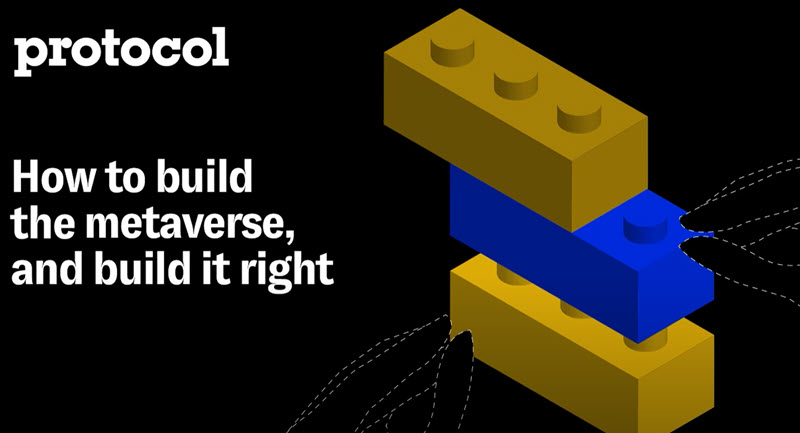‘The best laid schemes of mice and men gang aft agley’* seems an appropriate start to an article in Burns Week when it applies to the production as well as the topic of today’s DD. If the metaverse is not of interest, turn off now.
First, the phrase is apposite because today I found that “The internet giveth and the internet taketh away” (which thought may also have some relevance to today’s topic). I had planned today’s DD to be on a topic generated by a talk at CES. However, when I clicked on it, it was gone. Like the disappearing press release from ViewSonic about OLED monitors during the CES show (watch for more in the middle of the year), the event had been taken offline.
Fortunately, I had a back up scheme that also seemed to fit the message of Burn’s poem. Protocol Entertainment ran a panel session on ‘The Metaverse’. Up to now, my inclination has not been to cover this topic as it has been widely covered elsewhere and partly because I’m something of a sceptic. The panel session provided a number of different insights than those I had seen elsewhere. It’s available to view on YouTube.
The panel was:
-
Marc Petit, Epic Games Unreal Engine VP and GM (who opened the session)
-
Tiffany Xingyu Wang, Oasis Consortium co-founder and President and
-
Sly Lee, Emerge co-founder and CEO .
The point that Petit made was that much of what the metaverse is – multi-user systems, real time 3D graphics, immersion and live communication – has been under development for 20 years or more. Games companies are trying to turn their games into platforms. He pointed out that if you combine the numbers from Fortnite, Roblox and Minecraft, there are 300 million people using metaverse-like platforms every month — which equals the total use base of the internet in 1999. Gaming companies have a 20 year head start, it could be argued, Petit said (and I bet that’s what they are saying to potential investors! – editor).
It’s a new medium still, so there is a lot of learning to be done and experimenting to find what can be done to create great experiences in real time and with multi-users, Petit said. He also said that it’s not likely, or desirable, for a single company to ‘own the metaverse’. Open standards are central to fair development and one of the functions of Unreal Engine is to ‘democratise content creation’ in the Metaverse.
Petit believes that there is enough understanding to develop open standards to allow interoperability between different environments, but working out good ways to ensure fair economics may be harder to sort out. Assets (skins or objects) that consumers have in one environment need to be protected over time and that will be tricky.
Trust and safety will be big issues. The internet was not designed to be safe from the start and the Metaverse, said Wang of the Oasis Consortium which is trying to coordinate safety on the Metaverse. There are lessons from the development of the internet. There are already problems with AI (not enough diversity), data breaches and abuse. The Metaverse needs safety, diversity, inclusion and privacy by design. Although those things have become important on the internet now that’s because of the ‘wave of toxicity’ that we have seen.
(later in the talk, Wang said ‘the velocity of toxicity has been getting higher’ – that’s a good observation!)
Tracking voice in real time is harder than tracking text on platforms such as Facebook and Twitter, but Petit said that the use of voice reduces the level of toxicity online, if the environment is well designed for this. Wang said that voice moderation tools are new and generally work by converting to text, and then moderating. It can also be hard to identify who is saying what. Video moderation can be very expensive.
Lee said that his company believes that the development will need new hardware and his firm wants to help develop that. At the moment, his firm is working on aspects of touch and the sensations of touch. He doesn’t like the idea of haptics which seems to separate the touch from the emotion that it evokes. He also wants to end the use of keyboards in the new space.
There was some discussion of advertising, with Wang starting this, and Petit said that driving engagement with brands is probably a better way of using dollars than simple advertising, but either way, it’s best to let users’ choices of how they use their time and dollars to drive how it is done, rather than legislating it.
Petit sees real issues in keeping the Metaverse up-to-date with different hardware to allow content and assets to persist over time. That’s hard and it’s not clear how to do it, but as he said
‘You can eat an elephant one mouthful at a time’.
Petit doesn’t want the Metaverse to be immersive as a separate world, but rather an overlay on the world that is everywhere in our lives. There was agreement on the panel that ‘Ready, Player One’ hurt the concept more than it has helped.
Analyst Comments
I have been thinking about why I am somewhat sceptical about the metaverse. I think that at the current state of the art, the hardware needed to deliver the level of immersion that would make a virtual world really beneficial is just too bulky and cumbersome, while the small and light AR headsets will not offer that immersion. I suspect that I’m just not pushing my imagination enough. When I got my first mobile phone, it was a car phone as the battery and phone together were just too heavy for routine portability. I could not have conceived of the miraculous folding smartphones of today. Extend the same progress to VR headsets and I’m sure we’re going to see the same developments, if VR can gain enough volume and growth to fund the R&D in the way that the smartphone market has.
Now, after all this deep thinking, it may be time for a ‘wee dram’! (BR)
* ‘gang aft agley’ is an expression in old Scottish English meaning ‘oten goes wrong’.



